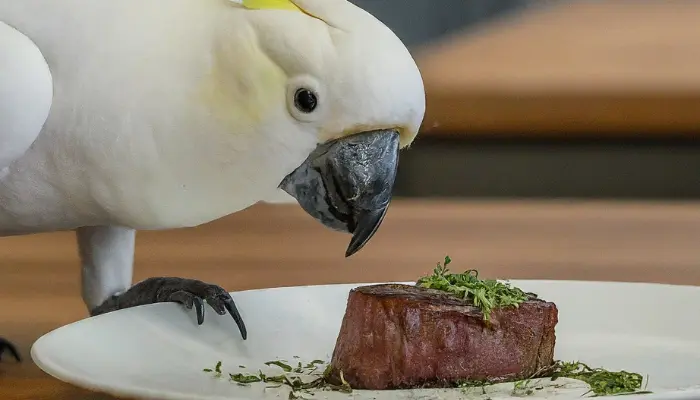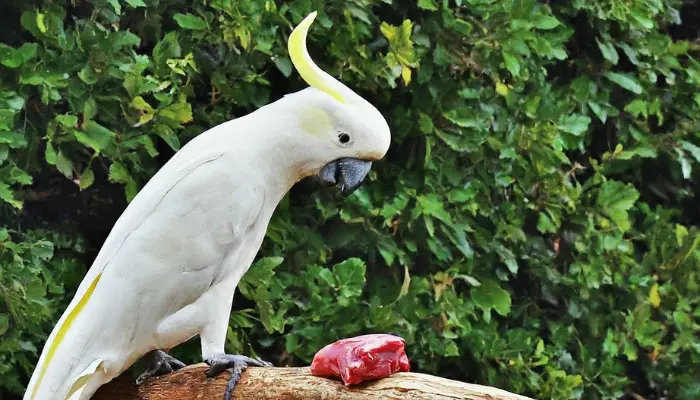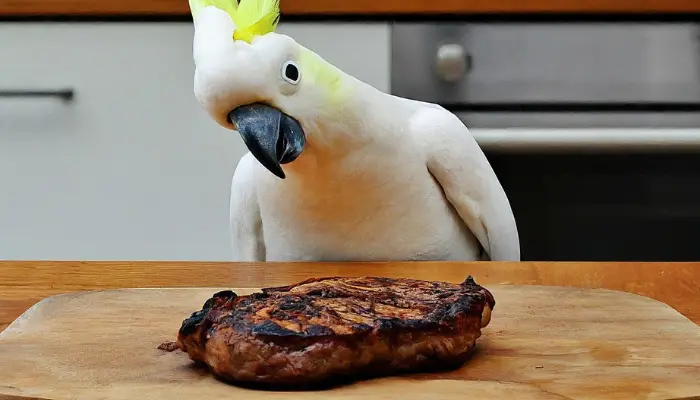Cockatoos are primarily herbivorous birds but they can occasionally eat small amounts of meat. In the wild, they might consume insects or small invertebrates as part of their diet. However, in captivity, it is not necessary to provide them with meat as they can thrive on a balanced diet of fruits, vegetables, seeds, and pellets formulated for cockatoos. If you are considering introducing meat into their diet, it is essential to do so sparingly and consult with a veterinarian who specializes in avian care to ensure it’s safe and appropriate for your bird.
Nutritional Benefits of Meat for Cockatoos
While cockatoos are primarily herbivorous and their main dietary requirements are met through fruits, vegetables, seeds, and pellets, providing small amounts of meat can offer some nutritional benefits. Here are a few potential benefits.
- Protein: Meat is a rich source of protein, which is essential for muscle development, repair, and overall health in birds. While cockatoos can obtain protein from plant sources, animal-based protein is generally more bioavailable and easier for them to digest.
- Essential Amino Acids: Meat contains all the essential amino acids that birds need for various bodily functions, including tissue repair, enzyme production, and immune system support. Incorporating meat into their diet can ensure they receive a well-rounded amino acid profile.
- Vitamins and Minerals: Meat, particularly lean cuts, can provide vitamins such as B vitamins (including B12) and minerals like iron and zinc, which are important for metabolic processes, immune function, and overall health in cockatoos.
- Variety: Offering a varied diet, including small amounts of meat, can prevent dietary monotony and provide enrichment for your cockatoo. Different textures, flavors, and nutritional profiles can keep them mentally stimulated and interested in their food.
- Mimicking Wild Behavior: In the wild, cockatoos may consume small amounts of insects or other animal matter as part of their natural diet. Providing occasional meat can mimic this behavior and contribute to their overall well-being.
It is important to note that while meat can offer nutritional benefits. It should only be provided as a supplement to their primary diet and in small amounts. Additionally, always ensure that any meat offered is cooked thoroughly and free from seasonings, spices, or additives that could be harmful to your bird. As always, consulting with a avian veterinarian before making significant changes to your cockatoo’s diet is recommended.

Can Cockatoos Eat Chicken?
It is not advisable to feed cockatoos chicken meat. Cockatoos are primarily herbivores and their natural diet consists of seeds, nuts, fruits, and vegetation. Feeding them chicken meat could upset their digestive system and may not provide the necessary nutrients they need. It is best to stick to foods that are safe and appropriate for their species.
Can Cockatoos Eat Pork?
Feeding cockatoos pork is not recommended. Like chicken, pork is not a natural part of their diet and could potentially cause digestive issues or other health problems. It’s best to stick to foods that are safe and appropriate for their species, such as seeds, nuts, fruits, and vegetables.
Can Cockatoos Eat Steak?
Feeding cockatoos steak is not advisable. Cockatoos are primarily herbivores, and their digestive systems are not adapted to process meat. Feeding them steak could lead to digestive issues or other health problems. It is best to provide them with a diet consisting of seeds, nuts, fruits, and vegetables, which are more suitable for their nutritional needs.
Can Cockatoos Eat Raw Meat?
Cockatoos are primarily herbivores, and their digestive systems are not designed to process raw meat. Feeding them raw meat could expose them to harmful bacteria such as salmonella or other pathogens, potentially causing digestive problems or illness. It is best to stick to foods that are safe and appropriate for their species, such as seeds, nuts, fruits, and vegetables. If you are considering introducing any new foods into your cockatoo’s diet, it is a good idea to consult with a veterinarian specializing in avian health to ensure it is safe and nutritionally balanced.

Why Meat Should Be Limited in a Cockatoo’s Diet?
Feeding meat to a cockatoo can present several disadvantages.
- Digestive Issues: Cockatoos have digestive systems adapted to processing plant-based foods. Introducing meat into their diet can lead to digestive problems, including upset stomach, diarrhea, or constipation.
- Nutritional Imbalance: Cockatoos require a balanced diet rich in vitamins, minerals, and other nutrients found in fruits, vegetables, seeds, and nuts. Meat does not provide the necessary nutrients in the appropriate proportions for cockatoos, potentially leading to nutritional deficiencies.
- Health Risks: Raw or improperly cooked meat can contain harmful bacteria such as salmonella or other pathogens. Consuming contaminated meat can lead to illness and compromise the cockatoo’s health.
- Behavioral Issues: Introducing meat into a cockatoo’s diet may disrupt their natural feeding behaviors and preferences. Cockatoos may become accustomed to the taste of meat and show disinterest in their usual diet, leading to potential nutritional deficiencies.
- Long-term Health Effects: Consistently feeding meat to a cockatoo over time may contribute to long-term health problems, including obesity, cardiovascular issues, and compromised immune function.
Overall, it’s best to provide cockatoos with a diet that aligns with their natural feeding habits and nutritional requirements, which primarily consists of seeds, nuts, fruits, and vegetables. If you’re considering introducing any new foods into your cockatoo’s diet, consult with an avian veterinarian to ensure it’s safe and nutritionally appropriate.
Conclusion
Cockatoos mainly eat plants and they can have small amounts of meat as a supplement in captivity. It is best to consult a vet before introducing meat into their diet. Prioritizing their natural food and seeking professional advice ensures their health and happiness.
